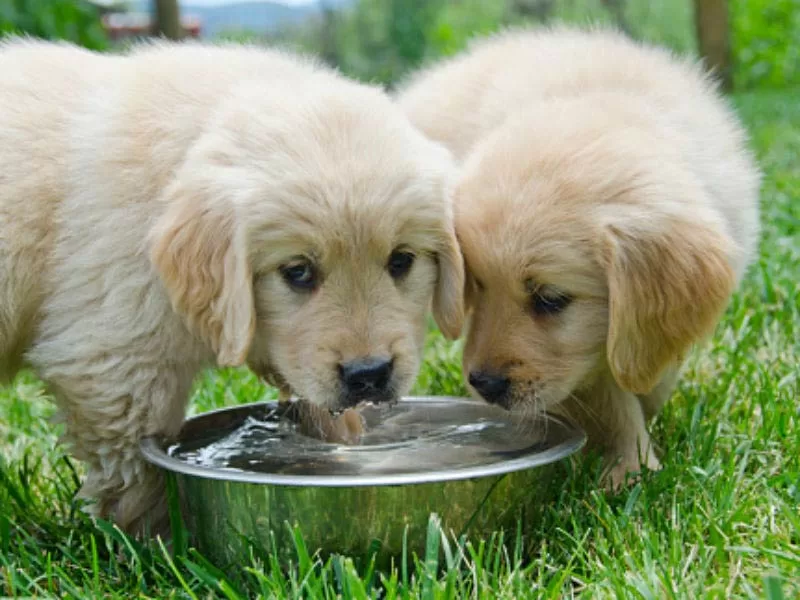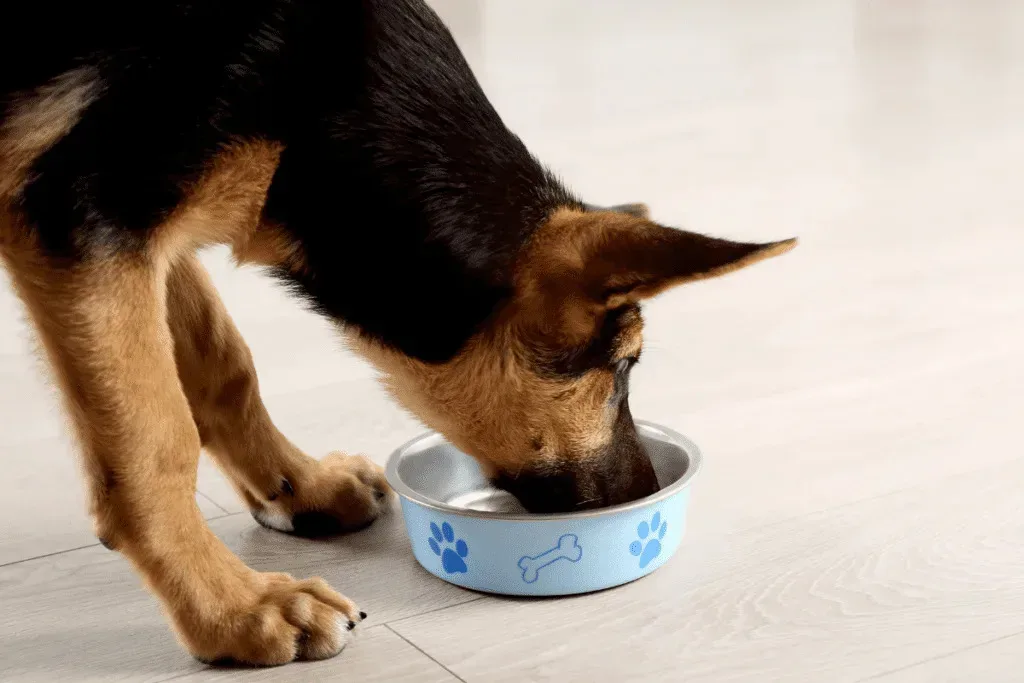| Age Range | Water Intake Schedule |
|---|---|
| Puppy (8 weeks to 3 months) | Offer water every 1-2 hours, especially after meals and play sessions. |
| 3-6 months | Offer water every 2-3 hours, especially after meals and physical activity. |
| 6-12 months | Provide access to water throughout the day. Offer water after meals, playtime, and exercise. |
| Adult | Provide access to fresh water at all times. Monitor water consumption and adjust as needed based on activity level and weather conditions. |
German shepherd puppy water schedule: Puppies are still growing, so they consume a lot of food and fluids. Also, your puppy may be constantly running and playing, and all that activity can make him thirsty.
Table of Contents
Losing even 10% of body water can lead to serious health problems. So, just as important as monitoring your puppy’s eating frequency is making sure he or she is drinking enough.
But how can you tell if your puppy is drinking too much or too little?
However, a good rule of thumb is to give your puppy 1 ounce of water per pound of body weight per day. So, if you have a 10-pound puppy, he should drink a little more than 1 cup of water a day.
5 Reasons Why Puppies need more water
Puppies need more water than adult dogs. Here are five reasons why:
- Hydration: Puppies have higher water requirements compared to adult dogs due to their rapid growth and development. Water is essential for maintaining proper hydration, which supports their overall health and bodily functions.
- Active Metabolism: Puppies have a higher metabolic rate than adult dogs, which means they burn energy faster. This increased metabolic activity leads to greater water loss through respiration, evaporation, and waste elimination, necessitating a higher intake of water.
- Body Temperature Regulation: Puppies are less efficient at regulating their body temperature compared to adult dogs. Water helps regulate the body temperature through panting and evaporative cooling. Sufficient water intake is crucial for preventing dehydration and heat-related issues.
- Growth and Development: Adequate water consumption is essential for proper growth and development in puppies. Water plays a vital role in nutrient absorption, circulation, and organ function. It supports the development of healthy bones, muscles, and tissues.
- Detoxification and Waste Elimination: Water helps flush out toxins from a puppy’s system and aids in the elimination of waste products through urine and feces. Sufficient water intake ensures proper kidney function and prevents urinary tract problems.
It’s important to monitor a puppy’s water intake and ensure they have access to clean and fresh water at all times. However, it’s also crucial to avoid excessive water consumption, as it may lead to overhydration. Consulting with a veterinarian can provide personalized guidance on the specific water needs of your puppy based on their breed, size, activity level, and overall health.
How much should my puppy drink?

When you bring your new puppy home, the first thing you want to know is how much water you should give them each day. After all, they need to stay young and hydrated, right? The short answer is that puppies should drink 1 ounce of water per pound of body weight per day. So, if your puppy weighs 4 pounds, they should drink 4 ounces of water each day.
Of course, there are a few things to keep in mind when it comes to how much water your puppy needs. First, they need more water on hot days or if they are very active. Second, puppies eat more when they’re teething, so they may need a little extra water at that time.
If you’re ever unsure how much water your puppy needs, ask your vet. They can give you appropriate advice based on your puppy’s individual needs.
How much water should a puppy drink during potty training?
Here’s a chart outlining a general guideline for how much water a puppy should drink during potty training:
| Age Range | Approximate Water Intake |
|---|---|
| 8-12 weeks | 1/2 to 1 cup of water every 2-3 hours |
| 3-4 months | 1/2 to 1 cup of water every 2-4 hours |
| 4-6 months | 1/2 to 1 cup of water every 4-6 hours |
| 6+ months | 1/2 to 1 cup of water every 6-8 hours |
When it comes to potty training your puppy, one of the most important things to keep in mind is how much water they should drink. This is because puppies are more prone to accidents if they drink too much water. On the other hand, if they do not drink enough water, they may suffer from constipation.
So, how much water should a puppy drink during potty training? The answer will surprise you…
Most experts recommend that puppies drink between ¼ to ½ cup of water per pound of their body weight per day. So, for a 10-pound puppy, they should drink between 2.5 and 5 cups of water per day.
Of course, this is a general guideline and you should always consult your veterinarian to determine the best water for your individual puppy. They can take into account factors such as your puppy’s age, activity level and health condition.
One thing to keep in mind is that puppies usually need to urinate more frequently than adult dogs. Therefore, you should increase their water intake if they have more accidents than usual.
If you’re not sure how much water your puppy is drinking, you can always check their water bowl to see if it’s empty more often than usual. You can also watch for signs of dehydration, such as excessive panting or lethargy.
If you think your puppy isn’t drinking enough water, try adding some wet food to their diet or give them ice cubes to lick. You can also try adding some water to their food.
If you are still concerned about your puppy’s water intake or if they are having accidents more often than usual, please consult your veterinarian.
Symptoms of Dehydration
Puppies that don’t get enough water can suffer from dehydration, a dangerous condition that can be fatal. Puppy dehydration can be caused by overheating and illness, especially vomiting, diarrhea, and fever.
- Gums are dry, tender or sticky. Check your puppy’s gums with your finger. If they look tender, gently press your finger on them. When you touch them, they should turn white and return to their original color within a few seconds.
- Skin Turgidity – The time it takes for your puppy’s skin to return to its original position after being pinched. Check his condition by gently pulling up the scruff around his neck. In a few seconds, his skin should snap back.
- Loss of appetite
- Immersed students
- Excessive breathing
If your puppy doesn’t like to drink (or play) try the following tips:
- Fill his water bowl with ice cubes. Chewing ice cubes adds a fun element, while also helping with hydration
- The drink is flavored with chicken or beef broth
- Place a treat in the bottom of his bowl
Over-hydration
Pay attention if your puppy seems to be drinking too much water. Puppies, especially, are very inquisitive. Your puppy may be playing in his water bowl, which is a behavioral issue rather than a medical one.
Also Read: Why Your Dog Should Be On Leash In Public Areas
However, if you believe your puppy is drinking more than playing, he may have an underlying medical problem that needs to be addressed immediately. Heavy drinking can indicate fever or infection, as well as chronic conditions such as diabetes, Cushing’s disease, kidney and liver disease.
Over-hydration symptoms include:
- Nausea
- Vomiting
- Coordination failure
- Lethargy
- Bloating
- pupils dilated
- Sucking excessively
- Gums that are pale
Conclusion
Having a new puppy comes with a lot of responsibilities. You have to decide what food to feed your dog, what toys are safe and enjoyable, how to house train, how to teach the puppy house rules and much more. Monitoring water intake, on the other hand, is equally important and should be part of regular daily care. Hydration is important for your puppy’s overall health and well-being.

